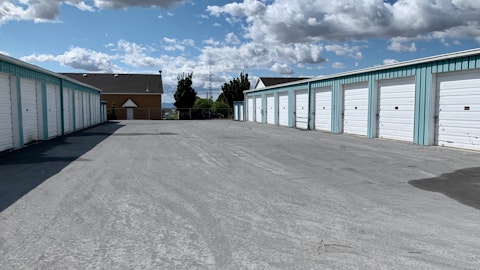And while we’re while we’re sharing merchant builder maxims from the ages; the mantra of a merchant builder is anything worth doing is worth doing excess and so that’s kind of where we find ourselves today. And that’s true in every one of our markets. There’s a supply issue to one degree or another.
Alex Jessett: The interesting thing about the fraudsters is they tend to go to the highest end properties and they tend to go to new properties. For example, our downtown Houston building, which is a 22 story building in downtown has the most fraud of any building in Houston, also the highest rents of any building we have in Houston. And if you go to Atlanta Buckhead, I think we have 35 lease breaks there and they were all fraudulent people. And so it’s interesting because the fraud folks tend to be the higher end going to the higher end property, more sophisticated. And then to Keith’s point in California, our bad debts in LA County are 5.3%, and in San Diego they’re 3.2%. And the difference between those two numbers is that San Diego is just more open and less sort of militant, if you want to say that, than LA County.
And so it’s definitely driven by the regulatory construct that has trained people to know that they don’t really have to pay. In the past you paid your phone bill first, then you paid your apartment rent. And now because of the government doing what they did during COVID apartment rent is down the list for more people than it should be. But we’re going to – we’re going to push it so that it goes to be right next to cell phone scan.
Rich Anderson: Awesome. Thanks very much, everyone.
Alex Jessett: Sure.
Operator: [Operator Instructions] Our next question comes from Connor Mitchell with Piper Sandler. Please go ahead.
Connor Mitchell: Hey, thanks for taking my question. So I’ll just keep it to the one as we’re at the top of the hour. With the updated guidance and the updated outlook for the current environment, can you just talk about how this impacts and affects the investment appetite development timing, deliveries for you guys and then the underwriting process and some assumptions that are going into that?
Ric Campo: So our current development pipeline is doing really well. The lease ups that we’re doing are doing really well. We just finished Tempe and it was a really solid return that we’re making on those. So we’re doing well on the existing portfolio. In terms of new starts or acquisitions or other capital deployment, I mean, this is a very unusual time. Our cost of capital has gone up dramatically and we recognize that and we understand that it doesn’t make a lot of sense to underwrite transactions today in the current environment based on our cost of capital. And so we have pushed back development starts and we have been very quiet on the acquisition front, obviously. And so I think though that as we get more stability, because I think what the world hates, and we all hate the most is volatility and not having some sort of stability and knowing having a view of what things are going to be in the future, right, I think that’s what’s sort of causing all this consternation in the market.
When you start thinking about capital in the future, though as we think what’s going to happen to development costs for example, when developments go from 550,000 units to 200,000 units, there’ll be lots of contractors that will work for food and that will squeeze margins that should with inflation overall coming down, with workers not having jobs as a result of construction costs or construction being shut down. We should be able to get a whole lot better pricing on properties in the future than we can today that has to play out during 2024. And so when that happens, then the question is, if you actually believe those start numbers, then in 2025 and 2026, it’s going to be a very constructive environment to deliver new properties. And if the capital markets are forcing merchant builders not to build, which is exactly what it’s doing, and we have the capital to build then maybe we – well if we get the right returns and balance our returns from a cost of capital and a spread perspective in the right zone, then perhaps we would start developing to be able to deliver into a really good market in 2026 and 2027.
We’re playing the long game here and we will – if that’s a countercyclical move relative to our competitors, we’ll do that. And then same thing goes with acquisitions. We have been – if you look at our history, since starting really in probably maybe ten years ago, we sold over $3 billion of properties, bought a bunch of properties and we sold older properties with lower growth and higher CapEx and reinvested in newer, lower CapEx, higher growth properties. And we did that on a very, very turned out to be accretive basis. And so the opportunity next year with capital the way it is today could open the opportunity for us to do a lot of that portfolio management as well. So, yes I think the bottom line is that today it’s a really weird world and there’s it makes sense to sort of, stand path with one of the strongest balance sheets in the sector and kind of wait and see to see where capital could be deployed in the future and what the best returns that we could make on that would be.
Connor Mitchell: Thanks. I appreciate all the color. That’s it for me.
Ric Campo: Sure.
Operator: Our next question comes from Wes Golladay with Baird. Please go ahead.
Wes Golladay: Hi, everyone. Thanks for sticking around. I have a question on the delta for the new leases in your fraud markets, would that be worse than your supply markets? And for those tenants that are the can pay but won’t pay, what type of recovery can you get there?
Keith Oden: So the recovery on can pay but won’t pay? Obviously, we turn people over to collection agencies. We pursue them. My guess is that before those folks actually go face the eviction music, in some cases they will try to have a conversation about, if I pay this, would you not pursue me? Those conversations go on all the time with to varying degrees of success. The can pay, won’t pays are an interesting subgroup that won’t pay, can’t pay, the recovery is actually quite low, but we do pursue them. I’m sorry. I didn’t catch the first part of your question, Wes?





